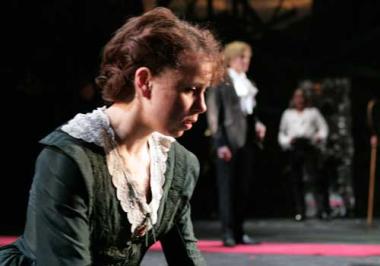The opening scene of The Porch is one of the out-and-out funniest and most perfectly formed comic set pieces I've ever seen: three elderly ladies sitting on wicker chairs, two of them trying to explain to the other, without getting too graphic, exactly what it was that Bill Clinton did with "that Polish girl."
It's a brilliant beginning for Jack Neary's play, which began life as a series of sketches and still shows some seams where they've been stitched together. An earlier version, titled Beyond Belief, was staged by New Century Theatre five years ago. The current version is now playing at the Majestic Theater in West Springfield, directed by the author.
True to its title, the play takes place on the front porch of a modest clapboard house (nicely rendered by set designer Greg Trochlil) in an unnamed New England city not a million miles from Neary's hometown of Lowell. Like most of his characters, the three women who hang out there, and the rather bumbling (I won't say henpecked) husbands of two of them, are working-class Catholics. The porch faces a convent school whose perimeter is patrolled by a vigilant sister (unseen) whose true calling seems to be no-parking enforcer.
Neary's plays specialize in poking sharp-eyed but sympathetic fun at the, er, parochial lives and outlooks of his characters. The Porch is essentially a series of conversations about sex: marital, extramarital, celebrity, Viagra-enhanced and post-menopausal. The talk—mostly seated, there's not much action—also touches on homosexuality, clerical celibacy and, inevitably, the sex-abuse scandal that has humbled the Church in recent years.
Most of the scenes are well stocked with laughs, but none of them can rise (excuse me) to the giddy inspiration of the bull's-eye beginning, where we meet the three main characters. (The husbands aren't exactly peripheral, but they're secondary in the play, as in their marriages.) The three women are outspoken Gert, ditzy Marjorie and shy, sheltered Alma, the one who requires enlightening about what her friends term "the oral," and who later stumbles into a hilarious misunderstanding when she thinks her friends are discussing "homeless sexuals."
Ellen Colton and Cheryl McMahon are reprising the roles they played in the earlier versions. Colton is delightfully bewildered as ever-bustling Alma, preparing for her annual Labor Day backyard picnic and wistfully remembering her deceased son and husband. McMahon is chirpy and vague as Marjorie, in a performance that too often recalls Jean Stapleton's Edith Bunker in All in the Family.
The plot, such as it is, eventually focuses on Alma and a secret sorrow she's been holding. But for me, this production's piston is Barbara McEwen as caustic Gert. Smiling only to scoff, she delivers the play's most stinging zingers with a wit as dry as sandpaper and repeatedly saves it from getting too cozy.
The husbands are John Thomas Waite and Stuart Gamble, a couple of amiable slobs, both of them alternately cocky and befuddled. Their own high-comedy moment is Waite's shaggy dog story about almost being unfaithful to Gert in a hotel room at Foxwoods. Gamble and McMahon also have a sweetly amusing exchange of later-life sex fantasies. These, and most of the other scenes in the piece, are rather rambling affairs, befitting their characters' decelerating thought processes, but could benefit from a less deliberate pace.
In the final scenes, when some hints dropped early on come home to roost, the sex talk turns serious, even a little bitter. I'm not convinced that the turn derives organically from the setup, but it gives the jokes an anchor without detracting from the overall hilarity.
The Porch: through Oct. 18, The Theater Project at the Majestic Theater, 131 Elm St., West Springfield, (413) 747-7797, www.majestictheater.com.
Grimm Comedy
All's Well That Ends Well is one of Shakespeare's "problem plays"—not a tragedy because it does indeed end without corpses, but a comedy with a dark side, shadowed with moral ambiguity. It features one of those smart, independent Shakespearean heroines who is unaccountably devoted to a clueless lug. She's Helena, who cures the French king of a fatal disease and is rewarded with the unwilling hand of the callow Count Bertram. He immediately runs off to war, pursued by his rejected bride, who uses a twist on Measure for Measure's bedroom switcheroo to snare her reluctant husband.
The new production at London's National Theatre solves the play's logical and dramaturgical problems by turning it into "a fairy tale for grownups," complete with a Tim Burton-esque Gothic castle and a heroine who is part Cinderella and part Red Riding Hood. The London press have praised Marianne Elliot's staging as "richly conceived" and "not far short of visionary." You can judge for yourself this coming week, when the production is broadcast around the world as part of the National's groundbreaking NT Live series. It lands on the screen at the Amherst Cinema Arts Center Oct. 1 at 7 p.m., Oct. 3 at 1 p.m., (413) 253-2547, amherstcinema.org.



